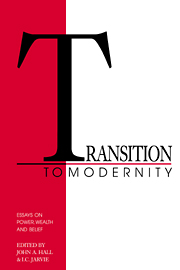Book contents
- Frontmatter
- Contents
- List of illustrations
- List of contributors
- Introduction
- PART I THE PRE-MODERN WORLD
- PART II TRANSITIONS TO THE MODERN WORLD
- PART III MODERNITY AND ITS DISCONTENTS
- 8 Science, politics, enchantment
- 9 Deconstructing post-modernism: Gellner and Crocodile Dundee
- 10 A methodology without presuppositions?
- 11 Gellner's positivism
- 12 Left versus Right in French political ideology
- 13 Property, justice and common good after socialism
- 14 Social contract, democracy and freedom
- 15 Thoughts on liberalisation
- 16 Peace, peace at last?
- Indexes
9 - Deconstructing post-modernism: Gellner and Crocodile Dundee
Published online by Cambridge University Press: 02 February 2010
- Frontmatter
- Contents
- List of illustrations
- List of contributors
- Introduction
- PART I THE PRE-MODERN WORLD
- PART II TRANSITIONS TO THE MODERN WORLD
- PART III MODERNITY AND ITS DISCONTENTS
- 8 Science, politics, enchantment
- 9 Deconstructing post-modernism: Gellner and Crocodile Dundee
- 10 A methodology without presuppositions?
- 11 Gellner's positivism
- 12 Left versus Right in French political ideology
- 13 Property, justice and common good after socialism
- 14 Social contract, democracy and freedom
- 15 Thoughts on liberalisation
- 16 Peace, peace at last?
- Indexes
Summary
ABSTRACT AND INTRODUCTION
This essay is an attempt to dispense with the negative aspects of Romanticism and examine whatever positive it has to offer – in the light of ideas scattered through diverse writings of Ernest Gellner.
A paragraph on the negative side of Romanticism, however, is in order, since Romanticism is negative at base: it developed in understandable disillusionment over the excessively optimistic claims of the Enlightenment after the fiasco of the French Revolution and its aftermath. Its discontent was wider than the Enlightenment, however: it was a discontent with civilisation as such, as was argued by Sigmund Freud in Civilization and its Discontents. The discontent, Freud suggested, was understandable: civilisation is repressive: we inculcate in our charges a disastrous distaste for food and for sex. There is no dissent from Freud on this; it is obviously in our tradition to create in our charges distaste for the appetites we share with other animals; thus the continuing appeal of these appetites creates ‘animalism,’ the desire to emulate other animals all the way, expressed, for example in the writings of Count Gobineau and of D.H. Lawrence. This negativism, understandable as it is (and Lawrence's autobiographical Sons and Lovers makes it hard not to sympathise with it), has no saving grace. Yet Romanticism also has something positive to offer: a search for integration, meaning, de-alienation. Can the positive ideas of Romanticism possibly be detached from the negative? Postmodernism is an attempt to answer this affirmatively and in detail. The question deserves a better treatment.
- Type
- Chapter
- Information
- Transition to ModernityEssays on Power, Wealth and Belief, pp. 213 - 230Publisher: Cambridge University PressPrint publication year: 1992
- 1
- Cited by



